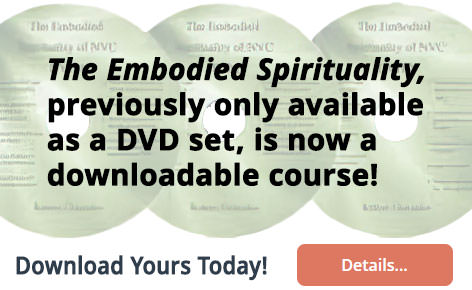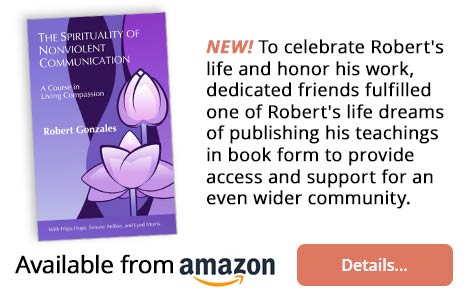

Welcome to the Robert Gonzales Training Legacy. Here you can learn more about Robert and the powerful teachings he dedicated his life to. NVC Academy is proud to house and share with you the complete body of his life's work. We invite you to explore, learn, and help keep his legacy alive!
Robert's passion was in the spirituality of the Nonviolent Communication (NVC) process. He saw NVC both as a process that helps people connect more authentically with themselves and others, and as a spiritual practice and way of living. The worldwide NVC community mourned when Robert died in 2021. He left behind a legacy of work that emerged from a lifetime of inquiry into the intersection between spirituality and human communication. More about Robert.
Practice Exercise
3 - 5 minutes
Without self-acceptance any attempt at growth and transformation, even while parenting, can easily become a path to self-judgments and another yardstick against which to measure ourselves as falling short. Instead, we can practice 1 minute a day or more, or while doing other tasks, to develop the self-compassion and self-acceptance needed to grow both new habits and our capacity to meet our children with calm and compassion.
Details...Trainer Tip
1 - 2 minutes
Trainer Tip: Our differences are not in our needs, but in how we attempt to meet them. This simple truth can help you lessen the conflicts in your life and your judgments of other people. Rather than focus on where you disagree, focus on where you are the same. This shift can make a profound difference in your ability to understand yourself and other people, and to bring unity to your life.
Details...Article
3 - 5 minutes
What parent hasn't experienced a surge of protectiveness when your child hurts their sibling? Our cultural training calls us to immediately take two roles: the judge, determining who was wrong and what the consequences will be, and the police, enforcing the consequences. These thankless jobs often result in frustration, resentment, pain, for all. Read on for an example of how empathy transformed a child's impulse to hit another child.
Details...Trainer Tip
1 - 2 minutes
Trainer Tip: Someone’s strategy for meeting needs may look different from yours, but it doesn’t mean they aren’t meeting them. This can happen when they appear to be messy and disorganized, but from their perspective they have it organized. It's just less apparent to you how they have organized it. Read on for a related anecdote.
Details...Trainer Tip
1 - 2 minutes
Trainer Tip: We may communicate indirectly when we worry about hurting someone’s feelings. Instead, commit to being direct with compassion, love, honesty, and respect to both yourself and others. They may not enjoy what you say, but at least they'll know where you're coming from. Being true to yourself, you can be true to your relationships. And it can build trust.
Details...Video
1 hour, 1 minute
How do you repair a relationship when your words or actions unintentionally impact another in a negative way? And what keeps you from apologizing? Join Lore to explore – and answer – these questions and more!
Details...Trainer Tip
1 - 2 minutes
Trainer Tip: Next time you prepare for a challenging conversation, solidly connect with your own feelings and needs before entering into meeting. Then attend the meeting open to creating results that work for everyone. This is likely to give increase chances that the conversation will come to a mutually satisfying conclusion.
Details...Article
13 - 19 minutes
While so many of us know how close we are to the edge of global catastrophe and want change, what makes the existing global system continue to function with our ongoing participation? Read on for more on the challenges and path towards learning to steward life and all the resources of this one planet for the benefit of all.
Details...Trainer Tip
1 - 2 minutes
Trainer Tip: Practicing NVC in situations that are not emotionally charged can give you valuable practice to help you maintain a compassionate consciousness when circumstances are charged. It can help you stay in that consciousness for a longer period of time. You can also practice by naming the needs that you got met in the situations you enjoy.
Details...Article
4 - 6 minutes
Praise may disconnect us from our own confidence, intrinsic motivation, or discernment. It may lead to perfectionism, people pleasing, codependency, a tendency to criticize others or fix others, and more. Instead, without evaluative words we can sincerely share what we specifically liked about what they did, and what needs were met for us.
Details...

